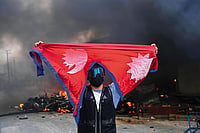The Third Tale
ONCE UPON A HARSH WINTER, IN THE HOUSE OF LATEEF Zaeldar, a baby boy was born. He was named Tufail, without much fanfare. Had he been born in the Zaeldar family during better times, the boy’s birth would have been celebrated with a splendiferous feast of tender lamb meat cooked in the finest wazwan. Those were the times when the Zaeldar family owned such unending stretches of land that almost everybody who lived around them was either their tenant or a sharecropper.
Then the great leader came to power – the lion of the mountains, the messiah of the poor, the saviour of the oppressed. His mighty roar officially declared the era of landlords to be over. Almost all of the Zaeldars’ land was taken away and distributed among their tenants. Akbar Zaeldar, Lateef’s father, began to sell the remaining land piece by piece to fund his search for a vocation that would be of real interest to him, befit his stature and also serve to revive the family’s fortunes.
His search continued, to no avail, year after expensive year.
Finally, when all that was left of the Zaeldars’ property was a big apple orchard, Akbar Zaeldar found his calling: he determined he would open a cinema, the grandest one around. Consequently, half of the apple orchard owned by the Zaeldars, as well as the family’s heirloom jewels, was sold off to erect the Taj Mahal of celluloid –Zaeldar Talkies.
Despite Akbar Zaeldar’s inherent propensity for courting disaster and the misgivings among the rest of the family about the cinema business, Zaeldar Talkies was a success. As people began to throng to it in unmanageable crowds, the Zaeldar family looked ahead to a revival of their legacy.
Having built his grand palace, Akbar was delighted to find his queen there as well. Her name was Bharti. She worked in a government office near Zaeldar Talkies and would occasionally catch shows of the latest releases at the cinema with her colleagues.
The first time Akbar Zaeldar laid eyes on Bharti was in the manager’s room at the cinema, where Bharti had arrived along with some of her female colleagues while Akbar was contemplating the next change on screen over a cup of tea with his manager. Bharti and her friends had wrangled a meeting with the manager to request the screening of a particular movie at Zaeldar Talkies. The film in question was known to be bad for business: although it was an over the-top, tear-jerking adaptation of a classic love story, spiced with every kind of masala, it had failed to win the interest of the moviegoing public, and most cinemas had shown no inclination to screen it. Zaeldar Talkies, too, had thus far followed the norm. But one look at the pleading, doe-eyed Bharti was enough for Akbar Zaeldar to announce the decree that Zaeldar Talkies would screen the film twice a day even if it meant doing so to an empty house. After all, love always came at a price.
Pretty soon Akbar and Bharti’s love affair burgeoned into a scandal. Akbar was already married, but even if he had not been, the chasm that lay between them in the form of their respective faiths
ensured that they would find no sympathizers among friends and relatives. Their relationship thus became restricted within a perpetual penumbra of rumours and hearsay: some believed that they had married only after Bharti had changed her faith and that was why her family had ostracized her; others held that the two were living in sin as neither Bharti nor Akbar had converted to the
other’s religion. Their audacity remained the talk of the town for a few weeks until a prominent politician’s wife ran away with a folksinger and the rumour-mongers got swept up in a fresh outrage.
At Zaeldar Kouet, however, the rumours did not create a furore, not even when a daughter was born to Akbar and Bharti. As long as Akbar did not acknowledge his little dalliance –publicly or privately– and kept Bharti and her daughter outside the house, the Zaeldars were willing to dismiss the affair as youthful frolic that they had to make an allowance for. He was not the first Zaeldar to do it, they reasoned, nor would he be the last.
But then tehreek broke out and everything was thrown off course. Amidst bomb blasts and curfews, posters began to appear on lamp posts and walls urging people to shun irreligious practices for
the sake of the cause, and when a formal list of items banned on these grounds was released, cinemas featured in it at number six. By this declaration, not only were cinemas deemed irreligious, but they were also identified as traps laid by the wily enemy to ensnare people, particularly the youth. An order was passed for them to be closed down immediately. Cinema owners were threatened, via ominous letters and armed men, to comply with the ban or be ready to face the worst. However, even as the cinemas began to wind up one by one, Zaeldar Talkies continued to run, even after a grenade was thrown at its entrance one afternoon. Akbar Zaeldar’s penchant
for drama led him to announce: ‘The show must go on.’ In private conversations, Akbar joked about the ban. ‘They did not ban VCRs, did they? Zaeldar Talkies is just a giant VCR, that is all it is,’ he would say, winking and laughing.
People who heard him wondered if the confidence in his voice just misplaced bravado was, but it was not – Akbar had reason to not take the threats seriously.
Before tehreek had started and the posters appeared, Zaeldar Talkies had screened Lion of the Desert, the biopic of Omar Mukhtar, the Libyan hero who helmed a resistance against Italian
colonizers. The movie instantly resonated with the local youth, who came in droves to watch it. This ‘lion of the desert’, who had chosen an honourable death over selling out, stood in glaring contrast to their own leader, the lion who had before his death let himself be tames. The movie brought his betrayal into sharp focus and young men who had walked into Zaeldar Talkies with the conviction that they would lay down their lives for their lion-leader emerged angry and protesting, denouncing the leader as a pretender and deceiver.
They held that he had preferred the lure of power over honour and trust, and at his death had passed on the betrayal to his inheritors. It was against these inheritors, who clung to their positions of power, bartering the trust that the people had reposed in them, that the angry and bitter voices of the people were now raised. The authorities immediately issued an order to Zaeldar Talkies to stop
the screening of the ‘seditious’ film and Akbar Zaeldar was forced to acquiesce. But in the bargain, he earned the sympathy of many as people locked to him to convey their solidarity and offer their gratitude.
(Excerpted from Shabir Ahmad Mir’s The Plague Upon Us with permission from Hachette India)























